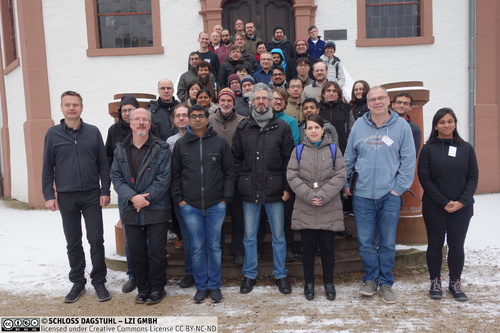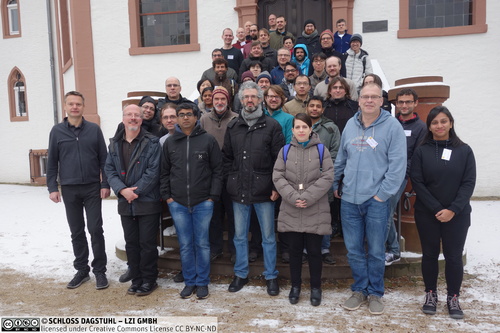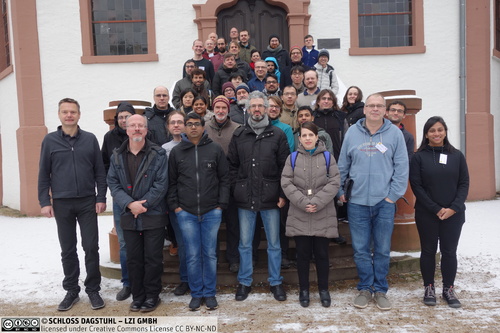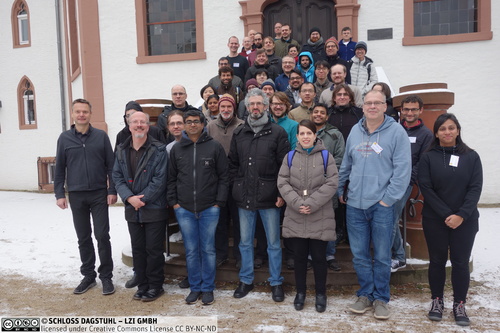Dagstuhl Seminar 19041
New Horizons in Parameterized Complexity
( Jan 20 – Jan 25, 2019 )
Permalink
Organizers
- Fedor V. Fomin (University of Bergen, NO)
- Dániel Marx (Hungarian Academy of Sciences - Budapest, HU)
- Saket Saurabh (Institute of Mathematical Sciences - Chennai, IN)
- Meirav Zehavi (Ben Gurion University - Beer Sheva, IL)
Contact
- Michael Gerke (for scientific matters)
- Annette Beyer (for administrative matters)
Schedule
In 2019 the parameterized complexity community will celebrate two round dates: 30 years since the appearance of the paper of Abrahamson, Ellis, Fellows, and Mata in FOCS 1989, which can be considered as the starting point of PC, and 20 years since the appearance of the influential book of Downey and Fellows “Parameterized Complexity”.
In these three decades, there has been tremendous progress in developing the area. The central vision of Parameterized Complexity through all these years has been to provide the algorithmic and complexity-theoretic toolkit for studying multivariate algorithmics in different disciplines and subfields of Computer Science. To achieve this vision, several algorithmic and complexity theoretic tools such as polynomial time preprocessing, aka, kernelization, color-coding, graph-decompositions, parameterized integer programming, iterative compression, or lower bounds methods based on assumptions stronger than P≠NP have been developed. These tools are universal as they did not only help in the development of the core of Parameterized Complexity, but also led to its success in other subfields of Computer Science such as Approximation Algorithms, Computational Social Choice, Computational Geometry, problems solvable in P (polynomial time) to name a few.
All cross-discipline developments result in flows of ideas and methods in both directions. In the last few years, we have witnessed several exciting developments of new parameterized techniques and tools in the following subfields of Computer Science and Optimization: Mathematical Programming, Computational Linear Algebra, Computational Counting, Derandomization, and Approximation Algorithms. A natural question is whether these domain-centric methods and tools are universal. That is, can they permeate boundaries of subfields and be employed wherever a Parameterized Complexity approach can be used? The main objective of this Dagstuhl Seminar is to initiate the discussion on which of the recent domain-specific algorithms and complexity advances can become useful in other domains.
 Fedor V. Fomin, Dániel Marx, Saket Saurabh, and Meirav Zehavi
Fedor V. Fomin, Dániel Marx, Saket Saurabh, and Meirav Zehavi
In 2019 the parameterized complexity (PC) community is celebrating two round dates: 30 years since the appearance of the paper of Abrahamson, Ellis, Fellows, and Mata in FOCS 1989, which can be considered as the starting point of PC, and 20 years since the appearance of the influential book of Downey and Fellows "Parameterized Complexity".
In these three decades, there has been tremendous progress in developing the area. The central vision of Parameterized Complexity through all these years has been to provide the algorithmic and complexity-theoretic toolkit for studying multivariate algorithmics in different disciplines and subfields of Computer Science. To achieve this vision, several algorithmic and complexity theoretic tools such as polynomial time preprocessing, aka kernelization, color-coding, graph-decompositions, parameterized integer programming, iterative compression, or lower bounds methods based on assumptions stronger than P=NP have been developed. These tools are universal as they did not only help in the development of the core of Parameterized Complexity, but also led to its success in other subfields of Computer Science such as Approximation Algorithms, Computational Social Choice, Computational Geometry, problems solvable in P (polynomial time) to name a few.
All cross-discipline developments result in flow of ideas and methods in both directions. In the last few years, we have witnessed several exciting developments of new parameterized techniques and tools in the following subfields of Computer Science and Optimization: Mathematical Programming, Computational Linear Algebra, Computational Counting, Derandomization, and Approximation Algorithms. A natural question is whether these domain-centric methods and tools are universal. That is, can they permeate boundaries of subfields and be employed wherever Parameterized Complexity approach can be used? The main objective of the seminar was to initiate the discussion on which of the recent domain-specific algorithms and complexity advances can become useful in other domains.
The seminar collected 46 participants from 18 countries. The participants presented their recent results in 26 invited and contributed talks. Open problems were discussed in open problem and discussion sessions.
 Fedor V. Fomin, Dániel Marx, Saket Saurabh, and Meirav Zehavi
Fedor V. Fomin, Dániel Marx, Saket Saurabh, and Meirav Zehavi
- Akanksha Agrawal (Hungarian Academy of Sciences - Budapest, HU) [dblp]
- Andreas Björklund (Lund University, SE) [dblp]
- Sergio Cabello (University of Ljubljana, SI) [dblp]
- Parinya Chalermsook (Aalto University, FI) [dblp]
- Yijia Chen (Fudan University - Shanghai, CN) [dblp]
- Radu Curticapean (IT University of Copenhagen, DK) [dblp]
- Holger Dell (Universität des Saarlandes, DE) [dblp]
- Friedrich Eisenbrand (EPFL - Lausanne, CH) [dblp]
- Henning Fernau (Universität Trier, DE) [dblp]
- Fedor V. Fomin (University of Bergen, NO) [dblp]
- Archontia C. Giannopoulou (TU Berlin, DE) [dblp]
- Petr A. Golovach (University of Bergen, NO) [dblp]
- Gregory Z. Gutin (Royal Holloway, University of London, GB) [dblp]
- Danny Hermelin (Ben Gurion University - Beer Sheva, IL) [dblp]
- Yoichi Iwata (National Institute of Informatics - Tokyo, JP) [dblp]
- Bart Jansen (TU Eindhoven, NL) [dblp]
- Mark R. Jerrum (Queen Mary University of London, GB) [dblp]
- Eun Jung Kim (University Paris-Dauphine, FR) [dblp]
- Christian Komusiewicz (Universität Marburg, DE) [dblp]
- Martin Koutecký (Technion - Haifa, IL) [dblp]
- Stefan Kratsch (HU Berlin, DE) [dblp]
- Ariel Kulik (Technion - Haifa, IL) [dblp]
- Euiwoong Lee (New York University, US) [dblp]
- Bingkai Lin (National Institute of Informatics - Tokyo, JP) [dblp]
- Andrea Lincoln (MIT - Cambridge, US) [dblp]
- Daniel Lokshtanov (University of California - Santa Barbara, US) [dblp]
- Pasin Manurangsi (University of California - Berkeley, US) [dblp]
- Dániel Marx (Hungarian Academy of Sciences - Budapest, HU) [dblp]
- Matthias Mnich (Universität Bonn, DE) [dblp]
- Jesper Nederlof (TU Eindhoven, NL) [dblp]
- Rolf Niedermeier (TU Berlin, DE) [dblp]
- Shmuel Onn (Technion - Haifa, IL) [dblp]
- Fahad Panolan (University of Bergen, NO) [dblp]
- Marcin Pilipczuk (University of Warsaw, PL) [dblp]
- Michal Pilipczuk (University of Warsaw, PL) [dblp]
- Peter Rossmanith (RWTH Aachen, DE) [dblp]
- Ignasi Sau Valls (CNRS - Montpellier, FR) [dblp]
- Saket Saurabh (Institute of Mathematical Sciences - Chennai, IN) [dblp]
- Hadas Shachnai (Technion - Haifa, IL) [dblp]
- Roohani Sharma (Institute of Mathematical Sciences - Chennai, IN) [dblp]
- Ramanujan Sridharan (University of Warwick - Coventry, GB) [dblp]
- Stefan Szeider (TU Wien, AT) [dblp]
- Dimitrios M. Thilikos (CNRS - Montpellier, FR) [dblp]
- Magnus Wahlström (Royal Holloway, University of London, GB) [dblp]
- Robert Weismantel (ETH Zürich, CH) [dblp]
- Meirav Zehavi (Ben Gurion University - Beer Sheva, IL) [dblp]
Related Seminars
Classification
- data structures / algorithms / complexity
Keywords
- Parameterized Complexity
- fixed-parameter tractability
- Mathematical Programming
- Approximation





 Creative Commons BY 3.0 DE
Creative Commons BY 3.0 DE
